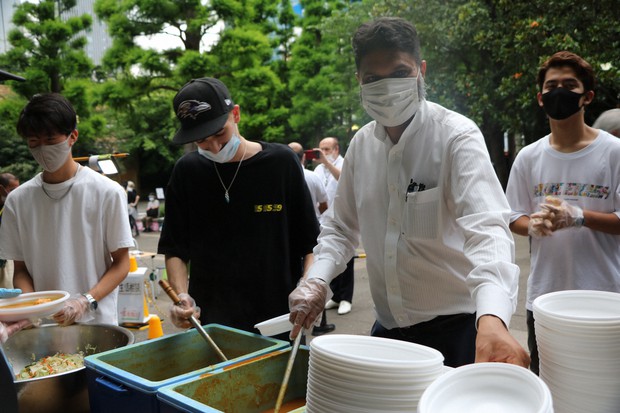A Pakistani, Haroon Qureshi, who arrived in Japan as a student some 30 years ago, is reaching out to those living on the margins of society.
According to a report published in Mainichi, the national daily of Japan, Qureshi, a businessman from Pakistan, helps the homeless and those foreigners who have been detained by immigration authorities after failing to get refugee status.
He is also involved in the running of a mosque in Tokyo, Otsuka Masjid.
According to the Japanese daily, Qureshi’s efforts started just when he arrived in Tokyo to study computer programming in 1991. He began distributing food to the homeless in his neighbourhood in the capital’s Kita Ward.
“Now, three decades on, he has enlisted Japanese university students in his goodwill endeavours, seeing their involvement as a vital part of raising society’s awareness of the plight of the less fortunate,” it said.
Read More: Study reveals Pakistanis prayed for India during Covid-19 crisis
The 55-year-old Qureishi said he believed there was a lack of understanding in Japan of why people ended up on the streets. He thinks the public’s attitude to the homeless is “cold.”
“The reality is that many times the homeless suffer from mental health issues and cannot fit into society,” the daily quoted him as saying.
So far, Qureshi had asked for students from Tokyo-based Keio and Tokyo universities to volunteer in his activities, which included serving meals to the needy.
In collaboration with Tenohasi in Tokyo’s Ikebukuro area, students and volunteers from the mosque recently helped in providing food to over 360 people.
“Today I witnessed a stark difference between normal people who were walking on the streets all dressed up, and those who had come to get food here,” the daily quoted Satoru Soejima, 18, who is studying Arabic at Keio University, as saying.
Qureshi, meanwhile, also leads another project called Food Bank to help the students themselves, some of whom have gone hungry after losing part-time work because of the coronavirus pandemic.
A soft-spoken man, he has also been helping those detained after their failed asylum bids since around 2000.
In one month, Qureshi received around 30 letters on average seeking help from detainees, mostly from countries in Africa or elsewhere in Asia.
“We may have different religions, colour or race. But I request everyone to try and feel the pain of other members of this huge (human) family, and do what they can,” he urged.
In recognition of his services the Pakistan Embassy in Japan awarded him with a letter of appreciation.
Ambassador Imtiaz Ahmad invited three extraordinary Pakistanis living in Japan for their social work that has also been highlighted in the Japanese media, including Qureshi.

According to the embassy, Qureshi was appreciated for his services that include providing food for the needy, financial help for the destitute and homeless, running an Islamic school and managing a graveyard for the Muslims.
The ambassador appreciated Qureshi’s work while stating that it has contributed positively to Pakistan and Pakistanis’ image living in Japan.
Qureshi thanked the Ambassador for the appreciation and vowed to continue and expand his humanitarian work, the embassy said.







